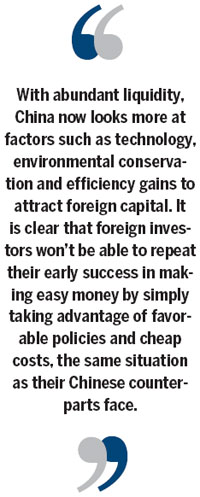Blueprint for a more prosperous future
Updated: 2013-11-22 10:34
By Cindy Chung and Ben Chow (China Daily Europe)
|
|||||||||||
Opportunities galore for foreign investors in government's new reform guidelines
China's fresh reform blueprint has tons of information for overseas investors, especially for those who have complained that opening-up in the world's second-largest economy has slowed after it joined the World Trade Organization in late 2001.
To begin with, it is clear that overseas investors will get more access to the Chinese market.
This judgment is backed by the unprecedented recognition given to the non-public sector, which mainly includes private and foreign investment, as seen in the blueprint released after the Third Plenum of the Communist Party of China's 18th Central Committee.
The communique clearly indicated that both the public and non-public sectors are important components of the economy.
What can be called a breakthrough is the statement that restrictions on overseas investment will be lifted in industries like services for children and the elderly, architectural design, accounting and auditing, commerce, logistics and e-commerce.

China has dismantled most of the barriers in its manufacturing and trade sectors since it joined the WTO, but could not make much headway in opening up the services sector.
The selection of the aforementioned industries for foreign investment, however, may mark the beginning of a systematic opening-up in the services sector.
The industries selected are either where Chinese companies have not been traditionally good or where homegrown companies have developed remarkable advantages. In industries like accounting and auditing, foreign investment is needed, as it would help China modernize and develop the sectors. In the case of other industries, such as e-commerce, local behemoths have been so strong that they do not fear foreign competition. From the wording of the document, it is clear that in most of these industries long-term restrictions such as stockholding limits will be done away with.
In addition, a fundamental change in the management of overseas investment is also on the cards, something that augurs well for foreign investors.
"Negative list" and "free trade zone" are words particularly mentioned in the blueprint. This means authorities are determined to overhaul the investment policy regime by granting foreign investors pre-entry national treatment.
Although the negative list for the Shanghai Free Trade Zone, the first such list that articulates industries China bars or limits foreigners from investing in, is disappointing for failing to greatly widen market access, it is believed that the updated versions in the coming years will make some breakthroughs. The chance for this to happen has increased since the blueprint has urged to "use opening-up to propel reform endeavors". It is clear that top policymakers are going to leverage foreign competition to press ahead with internal reforms that face strong resistance from interest groups.
What's more, there is also a window of opportunity for overseas companies to team up with Chinese firms for tapping into international markets. Foreign service providers such as travel agencies will benefit from a possible policy loosening for individual Chinese to travel and do business abroad.
The blueprint vows to encourage Chinese companies to go global, which is not new. But what is new is that authorities say that individuals and private companies will be the major part of China's go-global campaign. This is a breakaway from the earlier practice of the Chinese government mostly backing large projects undertaken by state-owned giants.
This attitude change will mean more private companies, most of which will be small, will be able to invest overseas. Unlike state giants, which usually invest overseas by their own or choose big-name foreign partners, these small companies will more likely need to team up with small overseas partners in finding opportunities outside China. This will offer a wealth of opportunities to foreign SMEs.
But not all things are positive for overseas investors.
The blueprint formally declares the end of an era when foreign investors were given preferential treatment, from a legal perspective. As the document puts it, China will unify laws governing domestic and foreign investments.
It is clear that the authorities want to create a level playing field for domestic and foreign companies and reinforce the idea in law.
Although similar moves to phase out preferential policies for foreign investors have been taken in recent years, as underpinned by unifying income tax rates in 2008, the blueprint means these measures will accelerate.
With abundant liquidity, China now looks more at factors such as technology, environmental conservation and efficiency gains to attract foreign capital. It is clear that foreign investors won't be able to repeat their early success in making easy money by simply taking advantage of favorable policies and cheap costs, the same situation as their Chinese counterparts face.
In addition, opening-up as stipulated in the blueprint will take time and it is likely that local protectionism within China will hinder the process in some regions.
For example, the blueprint says industries to be opened up in a gradual manner include financial services, education, culture and medical care. But without a timetable and specific target of the degree of opening in these sectors, we are not sure when the deregulation will happen and how deep it will go.
The authors are analysts with Shanghai-based Universal Consultancy. The views do not necessarily reflect those of China Daily.
(China Daily European Weekly 11/22/2013 page7)
Today's Top News
Premier Li heads west on opening-up tour
Deal reached in Iranian nuke talks
Roar of the East being heard
New air zone in line with practice
UN talks agree on major principles for climate pact
China maps out air defense ID zone
Nokia has 'phab' plan for Chinese mobile market
Newtown investigation report to be released
Hot Topics
Lunar probe , China growth forecasts, Emission rules get tougher, China seen through 'colored lens', International board,
Editor's Picks

|

|

|

|

|

|





